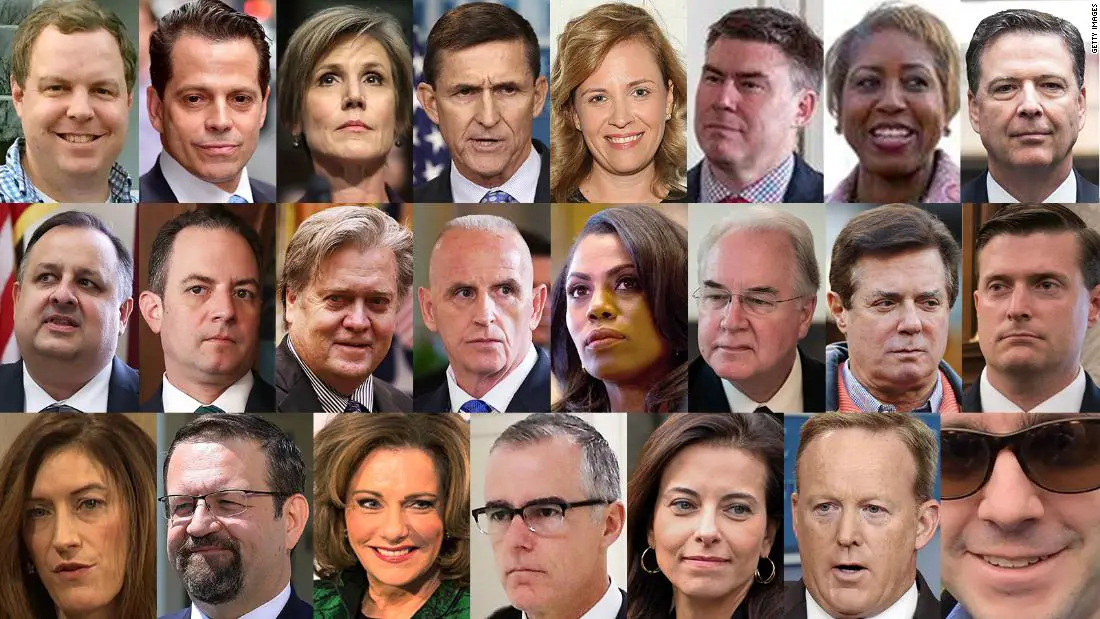Donald Trump has been in office for a little over a year but has had 35 people resign from his administration — so far. The amount of resignations in the Trump administration is much higher than that of any other past president.
CNN reports that there is a 43 percent turnover rate of senior staffers; the Clinton presidency, which had the second-highest turnover rate, trails Trump’s by a wide margin, coming in at 11 percent.
Many of those who are leaving the Trump administration were trusted advisors who worked closely with Trump or who were involved in communications and public relations for the White House.
Communication Issues
Sean Spicer was Donald Trump’s press secretary from the inauguration until July 21, 2017, and was the White House director of communications from June 2, 2017, to July 21, 2017.
However, when the White House appointed Anthony Scaramucci as the new communications director, Spicer decided to leave the administration. Spicer had told others that if Scaramucci was hired he would resign, and he followed through on that promise.
A few days into the job, Scaramucci gave the New Yorker a now-infamous interview, in which the newest admin trashed members of the Trump administration, including Reince Priebus, the chief of staff at the time, and Steve Bannon.
Scaramucci had criticized the two because he thought that they were leaking information to reporters, and he even went as far as to say that he would fire a bunch of staffers to prevent a leak.
After the new communication’s maestro’s massive PR blunder, Trump’s chief of staff, John F. Kelly, recommended the president fire the squeaky wheel. Trump listened to his counsel, ending Scaramucci’s tenure with the White House a full 10 days after it began.
After Scaramucci’s quick stint in the position, President Trump tapped Hope Hicks to fill the vacant position. Hicks acted as the communications director for longer than any of her three predecessors, ultimately occupying the role from August 2017 to Feb. 28, 2018.
During her time in the role, she acted as a trusted top advisor to Trump, and some within the administration even called her the “Trump whisperer,” as she appeared to have a preternatural gift for understanding and communicating with him.
After she announced her resignation, Trump praised her and her work at the White House, saying, “She is as smart and thoughtful as they come, a truly great person. I am sure we will work together again in the future.”
Despite the president’s praise for Hicks, she resigned just a day after testifying in front of the House Intelligence Committee for several hours, a sign that bodes ill for the president.
Changing Chief of Staffs
From Trump’s inauguration to the end of July, Reince Priebus was Trump’s Chief of Staff for about six months. Trump asked for his resignation just after the interview with Scaramucci was published.
Priebus officially resigned on July 27, but the announcement of his resignation was not until the following day, even as many staffers close to him continued to insist he was not resigning.
Priebus was not well-liked by Trump’s family and trusted advisors, Ivanka Trump and Jared Kushner. This likely stemmed from speculation of him leaking information to the press, the difficulty with Trump’s revised health care bill and other turmoil between staff happening in the White House.
Working under Priebus, Katie Walsh was a deputy chief of staff from the beginning of the Trump administration until March 30, 2017. She is now working at “America First Policies,” a pro-Trump group with the goals of helping to push through his legislation.
With this group, she is working to help push Trump’s agenda outside of the White House. Rick Dearborn, another deputy chief of staff who worked under Priebus, also resigned in mid-December to work in the private sector.
Ethical Situations
Tom Price was the Secretary of Health and Human Services until Sept. 29, 2017. His resignation was inevitable after the revelation that he had used taxpayers’ money to fund his private travel. The cost of these extravagant trips is reported to be over $1 million. His resignation is also rumored to coincide with the failure of the Trump administration to repeal Obamacare.
Carl Higbie, Chief of External Affairs at the Corporation for National and Community Services (CNCS), resigned on Jan. 18 of this year after inappropriate comments he made came to light.
The Trump appointee made offensive comments against women, African Americans, Hispanics, Muslims, the LGBT community, immigrants, veterans who have PTSD and people on Welfare in an interview on the radio from 2013.
Staff secretary Rob Porter resigned from his position at the White House following domestic abuse allegations by two of his ex-wives. One of his ex-wives, Jennifer Willoughby, had even filed an emergency protective order in 2010.
The White House’s story about these allegations is a little spotty with the details about whether or not they knew about the domestic abuse before hiring Porter as a staffer.
National Security Council
Michael Flynn was the National Security Advisor until information about him lying about communicating with Russian officials led to him leaving the White House February 13, 2017. Flynn lasted less than a month in his position in the White House.
Flynn’s deputy national security advisor, K.T. McFarland, was asked by Trump to step down and accept a position as an ambassador to Singapore on April 9. This is because Trump wanted Flynn’s replacement, H.R. McMaster, to be able to choose his own person for the position.
Tera Dahl, a strong ally of Trump’s former chief strategist Stephen Bannon, left her position as deputy chief of staff on the National Security Council (NSC) in early July 2017. Michael Anton, a White House spokesperson, said: “It was always her intent to move into a policy role.”
Her move to an outside organization also is likely because McMaster wants to have people of his own choosing on the council. Additionally, Derek Harvey, a top Middle East advisor, was asked to resign from the NSC as well.
Rich Higgins was asked to resign on July 21 as a staffer on the NSC following a controversial memo. The memo “POTUS & Political Warfare” describes ways that the media, members of the administration and others undermine Trump and his presidency with some conspiracy theories. He was told to resign by McMaster, who many speculate the memo describes in some parts.

















